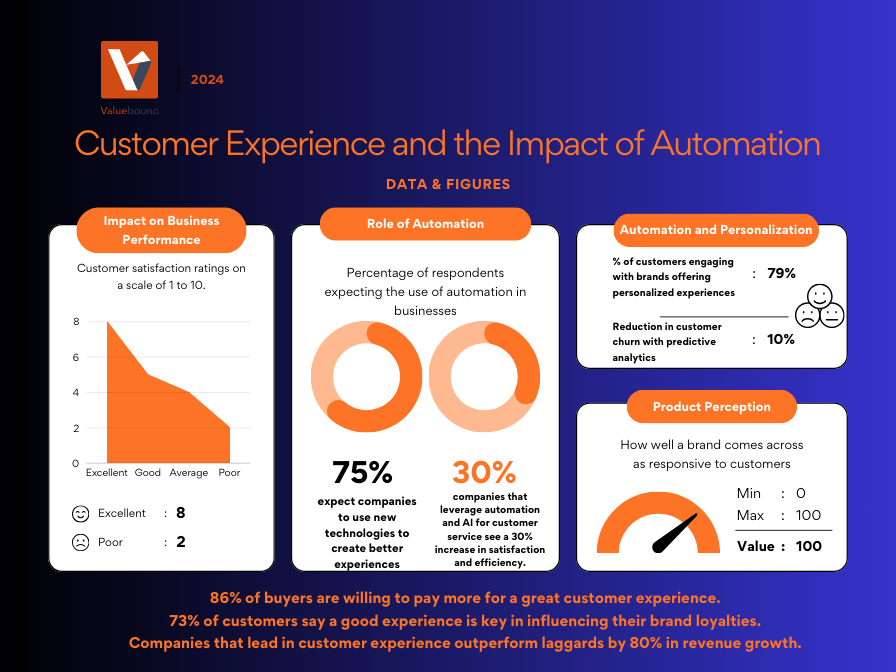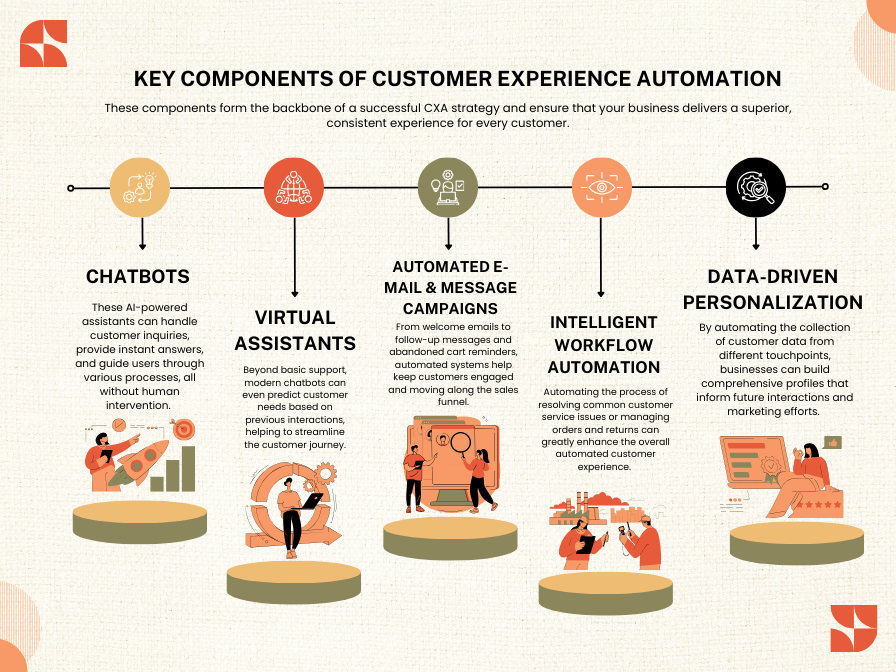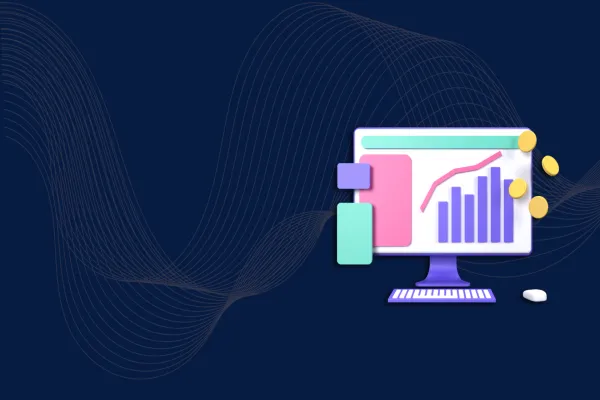In the modern business landscape, customer experience automation (CXA) is becoming a game changer. Businesses are no longer relying solely on traditional customer service channels. Instead, they are leveraging automation to create seamless, efficient, and personalized experiences that meet and exceed customer expectations. For C-suite executives, automated customer experience isn't just a buzzword; it's a transformative strategy that can reshape how businesses interact with their customers in the digital age.
In this blog, we’ll explore the growing importance of CXA, what it entails, and why it’s a critical strategy for businesses looking to stay ahead of the competition.
What Is Customer Experience Automation?
At its core, customer experience automation refers to the use of technology, primarily AI and machine learning, to manage and enhance interactions with customers throughout their journey. CXA encompasses automated processes in customer service, marketing, sales, and even product delivery. By integrating automation into these touchpoints, businesses can provide a more personalized, efficient, and consistent experience for their customers.
CXA goes beyond simple customer support automation like chatbots. It involves automating everything from personalized marketing campaigns to onboarding and post-purchase experiences, all with the goal of creating an optimized and cohesive customer journey.
Why Is Customer Experience Automation Important?

With businesses scaling further and customer expectations continuously rising, it has become daunting for the businesses to manage and deliver exceptional customer experiences manually. That is why there’s an increased need of automation; hence enters customer experience automation. By making repetitive and routine tasks more automated, businesses tend to focus on more strategic goals and deliver better CX and value through reduced operational costs, hyper-personalization and improved customer service and satisfaction.
1. Enhanced Efficiency and Speed
One of the major benefits that automated customer experience delivers is efficiency in customer interactions. Higher volumes of transactions, inquiries and requests can be best managed with the help of automated tools, which help deliver all of it simultaneously. This leads to a brand becoming more responsive, fast, and accurate in its communication. The customer gets shorter to negligible waiting time, faster resolution, and finally, a more satisfactory redressal; which ultimately creates an exceptional customer experience.
2. Consistency Across Channels
CXA can be a powerful tool in maintaining consistency across all channels. Whether a customer is reaching out through social media, or email, live chat or a feedback form, automation can help deliver a common message, and same level of attention and service. This is essential in an omnichannel world of today, where customers are expecting their brands to deliver seamless experiences; irrespective of how they engage with it.
3. Personalization at Scale
Among the most important benefits of customer experience automation is how it can deliver personalized experiences at scale. Since automation tools are powred by machine learning, LLMs, and AI, businesses can easily analyze customer data and user journey in real-time. This helps them deliver customized recommendations, promotions, and preference-based content depending upon a individual’s behaviour, needs, and choices. Such deeper level of personalization can foster a stronger relationship between a brand and a customer, thereby increasing brand loyalty and likelihood.
Key Components of Customer Experience Automation
Implementing CXA effectively requires understanding the key components that make up an automated customer experience. These components form the backbone of a successful CXA strategy and ensure that your business delivers a superior, consistent experience for every customer.

1. AI-Powered Chatbots and Virtual Assistants
Chatbots have become the face of customer experience automation. These AI-powered assistants can handle customer inquiries, provide instant answers, and guide users through various processes, all without human intervention. But beyond basic support, modern chatbots can even predict customer needs based on previous interactions, helping to streamline the customer journey.
2. Automated Email and Messaging Campaigns
Automating email and messaging campaigns allows businesses to send personalized communications at the right time based on customer behavior. From welcome emails to follow-up messages and abandoned cart reminders, automated systems help keep customers engaged and moving along the sales funnel.
3. Intelligent Workflow Automation
Automating internal workflows that directly impact the customer experience is another important aspect of CXA. For instance, automating the process of resolving common customer service issues or managing orders and returns can greatly enhance the overall automated customer experience. This frees up human resources to focus on more complex or high-value tasks.
4. Data-Driven Personalization
Automation tools allow businesses to collect, analyze, and leverage data to deliver more personalized experiences. By automating the collection of customer data from different touchpoints, businesses can build comprehensive profiles that inform future interactions and marketing efforts. This not only helps in meeting customer expectations but also fosters long-term relationships.
Benefits of Customer Experience Automation
As customer experience automation becomes more prevalent, businesses can expect a range of benefits that will transform their operations and customer relationships.
1. Cost Reduction
By automating repetitive tasks such as answering common inquiries, processing orders, or sending follow-up emails, businesses can significantly reduce the costs associated with manual labor. This cost-efficiency allows companies to allocate resources to more strategic areas, such as improving customer engagement and loyalty.
2. Increased Customer Satisfaction
Automation helps in providing faster and more accurate responses to customers, leading to a higher level of satisfaction. By resolving issues quickly and efficiently, businesses can build trust and foster positive relationships with their customers.
3. Scalability
As businesses grow, maintaining a high level of personalized service becomes challenging. With automated customer experience tools, scaling up operations while maintaining quality and consistency becomes far easier. Automation allows businesses to serve larger customer bases without sacrificing service quality.
4. Improved Employee Productivity
CXA doesn’t just benefit customers; it also improves the productivity of employees. By automating mundane and repetitive tasks, employees can focus on higher-level functions that require creativity and critical thinking. This leads to a more engaged workforce and better overall outcomes for the business.
Challenges of Customer Experience Automation
While CXA offers a myriad of benefits, it’s not without challenges. Implementing CXA requires careful planning and execution, especially in large-scale businesses. Here are a few common challenges:
Integration with Existing Systems:
Automating customer experiences often involves integrating new tools with existing platforms, which can be complex and require significant resources.
Over-reliance on Automation:
While automation improves efficiency, relying too heavily on it can sometimes lead to a loss of human touch, which remains critical in customer relationships.
Data Privacy Concerns:
With increased automation comes a greater reliance on customer data, which can raise concerns around data privacy and compliance with regulations like GDPR.
How Valuebound Approaches Customer Experience Automation
At Valuebound, we understand the critical role that customer experience automation plays in modern business success. By leveraging cutting-edge AI tools, machine learning, and automation platforms, we help businesses create seamless and personalized customer journeys that drive engagement and loyalty. Our approach ensures that businesses can deliver an automated customer experience that is efficient, scalable, and, most importantly, customer-centric.
We focus on integrating automation across multiple touchpoints, ensuring that every interaction—whether through a chatbot, email campaign, or social media channel—delivers a consistent and personalized experience. Our team works with businesses to design automation strategies that not only meet current needs but also evolve with the growing demands of the digital marketplace.
Ready to transform your customer interactions with automation? Partner with Valuebound to implement cutting-edge CXA strategies that drive results. Connect with us now!
FAQs
1. What is customer experience automation?
Customer experience automation is the use of technology, such as AI and machine learning, to streamline and enhance customer interactions across various touchpoints.
2. What tools are used in customer experience automation?
Popular tools include AI-powered chatbots, automated email and messaging systems, CRM software, and workflow automation platforms.
3. How can automated customer experience benefit my business?
Automation can reduce operational costs, improve customer satisfaction, and increase the scalability of your customer service efforts.
4. What challenges should I be aware of when implementing CXA?
Key challenges include system integration, maintaining a human touch in interactions, and ensuring compliance with data privacy regulations.





